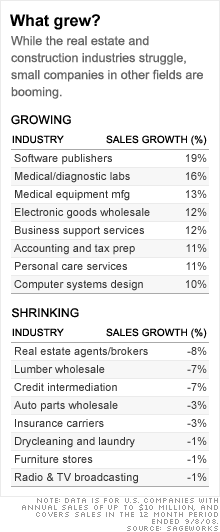What's selling now: Health care up, housing down
Some industries have flatlined, but small companies in fields such as software development and health care are still enjoying steady sales growth.

(CNNMoney.com) -- Small companies in the finance and real-estate fields have been hit hard this past year, reporting declines in many niches of the industry. But other small businesses are still thriving despite the economic downturn: Software publishers and medical labs enjoyed double-digit growth over the last 12 months, according to new research by financial services company Sageworks.
Sageworks, in Raleigh, makes financial management software that accountants use. By aggregating its data, Sageworks can track sales trends for private companies in a variety of industries. Among companies with less than $10 million in annual sales, the sectors that showed significant growth in the past year are those that are the most indispensable.
The administrative support and waste management sector, for example, grew 8%, with particular strength in business support services like document preparation and telephone call centers - that field grew 12%. The wide-ranging "professional, scientific, and technical services" sector also held strong, showing an overall average of 7% sales growth, with especially strong demand for accounting and IT infrastructure services.
"These top sectors are 'must-haves'," said Sageworks analyst Adam Filipponi. "You always need accountants and legal and tax services. Also, administrative services and software is important for companies that outsource payroll to cut costs."
The steady demand for professional services is no surprise to Boston-based graphic designer Chris Costello, whose business has been booming. According to Sageworks' data, the advertising field grew 7% this year, and sales of specialized design services like Costello's are up 4%.
"I don't do much marketing, but I've had to refuse work," Costello said. "My competitors are also doing well. A slow period is a perfect time to polish yourself, polish your services, and promote your company, including developing a Web presence."
At the other end of the spectrum, the finance and real-estate sectors eked out sales growth of 1% and 3% respectively, with many fields within the sectors showing declines. Real-estate agents and brokers were the hardest hit, reporting an 8% drop in sales, while lumber and construction supplies wholesalers had a 7% sales decline. Cement manufacturing also took a dive, showing a 7% sales drop.
"This is a trickle down from the housing slump," Filipponi said. "No one is buying houses, so there is not as much going on at the insurance, real estate and construction companies."
Sageworks' findings correlate with last week's employment report from the Bureau of Labor Statistics, which includes data from large businesses. Since September 2007, the construction sector has shed 374,000 workers and the financial sector has lost 64,000.
For builders, the forecast is grim. "We're forecasting a slow winter unless something drastic happens," said Tom Rooney, director of sales and marketing at Mark Winter Homes in Appleton, Wisc. "We had to lay off employees and cut back staff ... though there are plenty of people who want to buy, there's too much uncertainty. [Lack of] consumer confidence as a whole is slowing down the home building industry."
One common thread that links growing small companies: Cash. Many of the fields showing sales strength in Sageworks' survey are those with the strongest cash flows from operations, Filipponi said. As credit dries up, having a cash cushion is essential for growth.
Certainly that's the case with Web designer Costello, who is very slowly expanding into the font software business. "I'm taking a conservative approach, waiting until I have cash in hand or know I can pay off the credit within two months," he said. "Obviously, it would be bad to have debt when I may not be generating revenues, so I'm going to stay safely on the sidelines until the economy improves." ![]()
-
The Cheesecake Factory created smaller portions to survive the downturn. Play
-
A breeder of award-winning marijuana seeds is following the money and heading to the U.S. More
-
Most small businesses die within five years, but Amish businesses have a survival rate north of 90%. More
-
The 10 most popular franchise brands over the past decade -- and their failure rates. More
-
These firms are the last left in America making iconic products now in their twilight. More












